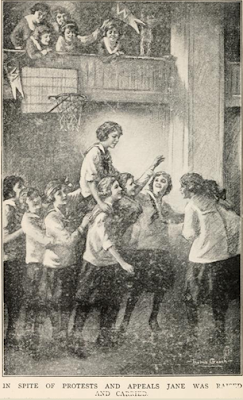Someone has added the above annotation to the scanned copy on Google. And luckily, it's quite true--this book is compulsively readable and the best of the series. This year, Jane has decided that she and Judy must go in for that specialization in social work, complete with 200 hours of field work. Judy hauls in truant boys, while Jane takes on the Jennings/Castbolt family. Mrs. Jennings is a young widow with two baby children, living with her also-widowed mother, Mrs. Castbolt. They're eeking out a living while Mrs. Jennings's brother/Mrs. Castbolt's son, Renny, finishes his final year of an engineering degree. Unfortunately, Mrs. Jennings has given their pittance of savings to Carol Dare, an "agent" of sorts, hoping to get on the stage and get more money for the family. Of course, this fails, and unless Renny drops out of school, they'll lose the house. Their only other hope is a wealthy uncle, who just HAPPENS to be Henry Allen's old friend.
While Jane manages to solve everyone's problems per usual, this book is much more fun as to what happens along the way. The girls take in the two babies to Madison Hall for a night, and Judy also has hilarious adventures with her "hooky boys." In another side plot, Judy has the school "adopt" an elderly man, who just happens to be the grandfather of Carol Dare. Honestly, it's not too far from the usual series book do-gooding, but doing it through the lens of social work makes it less cloying. Finally, this book has boys and romance! There's a prom, and Renny is a great romantic interest. He reminds me of Bill from the Patty Fairfield series, so far as the humbler origins/self-made bit. I really hate that the story ends with this title.
This book does raise interesting issues as far as the then relatively new idea of girls being in school at all, let alone actually pursuing a career. In one scene, the girls bemoan how being away at school hurts their chances with boys back home. They also give Jane a hard time as far as taking time away from sports and school fun to do her field work. Jane's father, especially, really is not into her taking on ANY job, let alone social work--he doesn't "want Jane to devote a promising young life to a restricted career." In the end, it turns out that he's asked their supervisor to restrict her to this case, since he's friends with the uncle. Jane, oddly enough, is okay with this. It's one of the many mixed messages this book gives. I wonder how the romance and career would have both been incorporated had the series continued--ideally in the vein of Beverly Gray, I think.
- Social work "had only been recognized as a profession since college graduates were required by the Social Service promoters." The book is really interesting as far as info about the establishment and workings of Social Services. Very unique in a series book, to the best of my knowledge.
- "But we have had the games all through our three years," is the only real mention of basketball in this book (refereeing is the only one in the last one, for the record), and it's offered as a weak protest to the girls field work. I will also point out that it's actually been four years--memory slip, or futher proof that Josephine Chase did not author the later titles?
- Dozia tells a long, hilarious story based around wearing (and not wearing) stockings with a bathing suit and a misunderstanding with her fiance, Phil. It's worth reading, I promise! I can't condense it any better than that.
- Mrs. Castbolt and her sister were both seminary grads, and they (and Jane) bemoan Mrs. Jennings decision to marry immediately after college, "Married the year she graduated! The clause repeated itself. Just imagine!"
- "The fact that gentlemen were now permitted to come to Wellington and take part in the big social affairs, gave the zest that goes to make any affair interesting." Finally! An explanation of all the girls-only dances of the first three books.
- It's too bad that there weren't boys until this book, because the writing about it completely captures schoolgirl crushes. "When he was gone, a few minutes later, Jane and Judith fell into each other's arms like two high school girls." None of Nancy Drew's nonchalance/disinterest here.
- "Then he smiled down at her, and she felt so small--he was so tall and so protective. The two old friends were talking eagerly over near the window, and the young folks--well, they were not saying much just then. The air was tingling with interest, and Jane must have been very happy; for again 'youth will be served.'"Clearly, Renny was to be the romantic lead for the rest of the series.
- "Was there anything else to be settled? If so it will have to be told in the next volume of this series to be entitled: Jane Allen: Graduate." :-(
- Final count for things that were restricted to the first three books: basketball, no boys, and Marian Seaton. Carol Dare is the only real enemy of this volume, and she's not much of one. I hate enemies, so even more points for this book.




